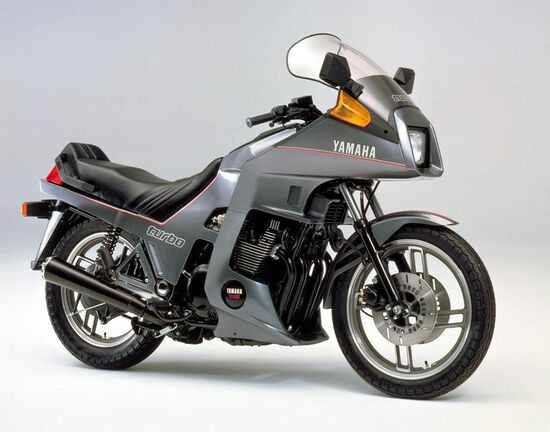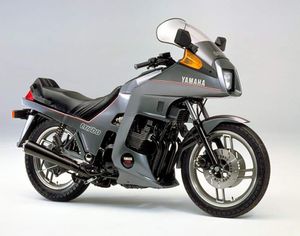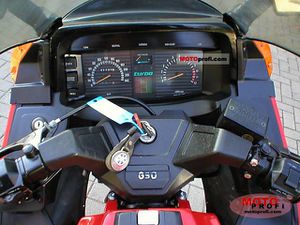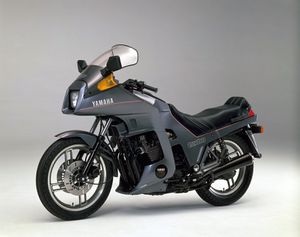Difference between revisions of "Yamaha XJ650 Turbo"
m |
m |
||
| (9 intermediate revisions by the same user not shown) | |||
| Line 1: | Line 1: | ||
| − | {{DISPLAYTITLE:Yamaha XJ650 Turbo (Seca Turbo 650)}} | + | {{DISPLAYTITLE: Yamaha XJ650 Turbo (Seca Turbo 650)}} |
| − | + | __notoc__ | |
| − | + | [[file: 0_11054c_e9805070_XL.jpg | 550px | center | Yamaha XJ650 Turbo (Seca Turbo 650)]] | |
| − | + | The Yamaha XJ650 Turbo appeared in 1982. The model was taken as a basis for the Yamaha XJ650R (in the American market it was sold with a prefix in the name - Seca), which received a sporty design with a front fairing and a turbocharger. The new model was available in the North American market (sold under the name - “Yamaha Seca Turbo 650”) and Europe. | |
| − | + | {{Ads_top}} | |
| − | + | However, like other turbocharged Japanese motorcycles of the time, the Yamaha XJ650 Turbo was very expensive and had low sales. In 1983, the motorcycle was featured in one of the James Bond films - "Never Say Never Again". | |
| − | |||
| − | |||
| − | |||
| − | |||
| − | + | The Yamaha XJ650 Turbo is based on an in-line 4-cylinder air-oil cooled engine with a volume of 653 cc, producing 90 hp. power and almost 82 Nm of torque. Unlike similar Japanese models with a turbocharged engine, the Yamaha XJ650 Turbo was distinguished by cheaper equipment - in particular, the use of carburetors, instead of electronic injection, a rear drum brake (competitors had disc brakes front and rear) and a double rear shock absorber (similar models from other manufacturers used a more modern monoshock and even progressive swingarms - Honda's Pro-Link and Kawasaki's Uni-Trak). In addition, the motorcycle from Yamaha, compared to competitors, looks more outdated (by modern standards). | |
| − | + | Other features of the Yamaha XJ650 Turbo include a steel tubular frame, simple suspension in the form of an air fork at the front and a double shock absorber at the rear, a front disc and rear drum brake, a 15.5 liter fuel tank, a 5-speed gearbox, a cardan drive and 249 kg curb masses. | |
| − | 1983 | + | 1983 was the last year of production of the Yamaha XJ650 Turbo, after which it finally left the market and did not receive further development. |
| − | '' | + | '' Turbocharged motorcycle models from other Japanese manufacturers: '' |
| − | * [[Honda_CX500_Turbo|Honda CX500 Turbo]] / [[Honda_CX650_Turbo|Honda CX650 Turbo]] | + | * [[Honda_CX500_Turbo | Honda CX500 Turbo]] / [[Honda_CX650_Turbo | Honda CX650 Turbo]] |
| − | * [[Kawasaki_GPZ750_Turbo|Kawasaki GPZ750 Turbo]] / [[Kawasaki_Ninja_H2_(H2R)|Kawasaki H2]] | + | * [[Kawasaki_GPZ750_Turbo | Kawasaki GPZ750 Turbo]] / [[Kawasaki_Ninja_H2_ (H2R) | Kawasaki H2]] |
| − | * [[Suzuki_XN85_Turbo|Suzuki XN85 Turbo]] | + | * [[Suzuki_XN85_Turbo | Suzuki XN85 Turbo]] |
| − | == | + | == Photos == |
| − | {| border="0" | + | {| border = "0" |
| − | |[[Image:0 11054c e9805070 XL.jpg| | + | | [[Image: 0 11054c e9805070 XL.jpg | 300px | thumb | Yamaha XJ650 Turbo]] |
| − | |[[Image:Yamaha xj 650 turbo 1986 3 lgw.jpg| | + | | [[Image: Yamaha xj 650 turbo 1986 3 lgw.jpg | 300px | thumb | Yamaha XJ650 Turbo]] |
| − | |[[Image:Yamaha xj650 turbo 1.jpeg| | + | | [[Image: Yamaha xj650 turbo 1.jpeg | 300px | thumb | Yamaha XJ650 Turbo]] |
| − | |||
|- | |- | ||
|} | |} | ||
| − | == | + | {{Ads_feed}} |
| − | + | {{Ads_post}} | |
| − | {| class="wikitable" | + | |
| − | ! scope="row"| | + | == Specifications == |
| − | |Kawasaki Yamaha XJ650 Turbo | + | Specifications Yamaha XJ650 Turbo: |
| + | {| class = "wikitable" | ||
| + | ! scope = "row" | Model | ||
| + | | Kawasaki Yamaha XJ650 Turbo | ||
|- | |- | ||
| − | ! scope="row"| | + | ! scope = "row" | Motorcycle type |
| − | | | + | | sports and tourist |
|- | |- | ||
| − | ! scope="row"| | + | ! scope = "row" | Release year |
| − | |1982-1983 | + | | 1982-1983 |
|- | |- | ||
| − | ! scope="row"| | + | ! scope = "row" | Frame |
| − | | | + | | steel tubular |
|- | |- | ||
| − | ! scope="row"| | + | ! scope = "row" | Engine type |
| − | |4- | + | | 4-cylinder, 4-stroke, in-line, turbo-charged |
|- | |- | ||
| − | ! scope="row"| | + | ! scope = "row" | Working volume |
| − | |653 | + | | 653 cm³ |
|- | |- | ||
| − | ! scope="row"| | + | ! scope = "row" | Bore / stroke |
| − | |63 | + | | 63.0 x 52.4 mm |
|- | |- | ||
| − | ! scope="row"| | + | ! scope = "row" | Compression ratio |
| − | |8.2:1 | + | | 8.2: 1 |
|- | |- | ||
| − | ! scope="row"| | + | ! scope = "row" | Cooling |
| − | | | + | | air-oil |
|- | |- | ||
| − | ! scope="row"| | + | ! scope = "row" | Number of valves per cylinder |
| − | |DOHC, 2 | + | | DOHC, 2 valves per cylinder |
|- | |- | ||
| − | ! scope="row"| | + | ! scope = "row" | Fuel supply system |
| − | | | + | | carburetor, 4x Mikuni BS30 |
|- | |- | ||
| − | ! scope="row"| | + | ! scope = "row" | Ignition type |
| − | | | + | | transistor |
|- | |- | ||
| − | ! scope="row"| | + | ! scope = "row" | Maximum power |
| − | |90 | + | | 90.0 h.p. (66.2 kW) at 9000 rpm |
|- | |- | ||
| − | ! scope="row"| | + | ! scope = "row" | Maximum torque |
| − | |81 | + | | 81.7 Nm (8.3 kg * m) at 7500 rpm |
|- | |- | ||
| − | ! scope="row"| | + | ! scope = "row" | Gearbox |
| − | |5- | + | | 5-speed |
|- | |- | ||
| − | ! scope="row"| | + | ! scope = "row" | Drive type |
| − | | | + | | cardan |
|- | |- | ||
| − | ! scope="row"| | + | ! scope = "row" | Front tire size |
| − | |3.25V19-4PR | + | | 3.25V19-4PR |
|- | |- | ||
| − | ! scope="row"| | + | ! scope = "row" | Rear tire size |
| − | |120/90 V18 | + | | 120/90 V18 |
|- | |- | ||
| − | ! scope="row"| | + | ! scope = "row" | Front brakes |
| − | |2 | + | | 2 discs, 267 mm, 1-piston calipers |
|- | |- | ||
| − | ! scope="row"| | + | ! scope = "row" | Rear brakes |
| − | | | + | | drum |
|- | |- | ||
| − | ! scope="row"| | + | ! scope = "row" | Front suspension |
| − | | | + | | Showa Pneumatic Forks 36mm, Travel - 140mm |
|- | |- | ||
| − | ! scope="row"| | + | ! scope = "row" | Rear suspension |
| − | | | + | | linkage with two shock absorbers, stroke - 96 mm |
|- | |- | ||
| − | ! scope="row"| | + | ! scope = "row" | Motorcycle length |
| − | |2170 | + | | 2170 mm |
|- | |- | ||
| − | ! scope="row"| | + | ! scope = "row" | Motorcycle width |
| − | |730 | + | | 730 mm |
|- | |- | ||
| − | ! scope="row"| | + | ! scope = "row" | Motorcycle height |
| − | |1355 | + | | 1355 mm |
|- | |- | ||
| − | ! scope="row"| | + | ! scope = "row" | Wheelbase |
| − | |1440 | + | | 1440 mm |
|- | |- | ||
| − | ! scope="row"| | + | ! scope = "row" | Saddle height |
| − | |780 | + | | 780 mm |
|- | |- | ||
| − | ! scope="row"| | + | ! scope = "row" | Minimum ground clearance |
| − | |140 | + | | 140 mm |
|- | |- | ||
| − | ! scope="row"| | + | ! scope = "row" | Acceleration to 100 km / h |
| − | |4 | + | | 4.9 sec |
|- | |- | ||
| − | ! scope="row"| | + | ! scope = "row" | Maximum speed |
| − | |205 | + | | 205 km / h |
|- | |- | ||
| − | ! scope="row"| | + | ! scope = "row" | Fuel tank capacity |
| − | |15 | + | | 15.5 l (including reserve - 2.2 l) |
|- | |- | ||
| − | ! scope="row"| | + | ! scope = "row" | Motorcycle weight (curb) |
| − | |249 | + | | 249 kg |
|- | |- | ||
|} | |} | ||
| − | == | + | == Documentation == |
| − | + | [[Category:Motorcycles]] | |
| − | + | * [https://www.xjcd.org/book/export/html/267 Yamaha XJ650 Turbo (Service Manual)] | |
| − | |||
| − | |||
| − | |||
| − | |||
| − | |||
| − | == | + | == == |
| − | + | {{Ads_recomended}} | |
Latest revision as of 20:21, 15 August 2021
The Yamaha XJ650 Turbo appeared in 1982. The model was taken as a basis for the Yamaha XJ650R (in the American market it was sold with a prefix in the name - Seca), which received a sporty design with a front fairing and a turbocharger. The new model was available in the North American market (sold under the name - “Yamaha Seca Turbo 650”) and Europe.
However, like other turbocharged Japanese motorcycles of the time, the Yamaha XJ650 Turbo was very expensive and had low sales. In 1983, the motorcycle was featured in one of the James Bond films - "Never Say Never Again".
The Yamaha XJ650 Turbo is based on an in-line 4-cylinder air-oil cooled engine with a volume of 653 cc, producing 90 hp. power and almost 82 Nm of torque. Unlike similar Japanese models with a turbocharged engine, the Yamaha XJ650 Turbo was distinguished by cheaper equipment - in particular, the use of carburetors, instead of electronic injection, a rear drum brake (competitors had disc brakes front and rear) and a double rear shock absorber (similar models from other manufacturers used a more modern monoshock and even progressive swingarms - Honda's Pro-Link and Kawasaki's Uni-Trak). In addition, the motorcycle from Yamaha, compared to competitors, looks more outdated (by modern standards).
Other features of the Yamaha XJ650 Turbo include a steel tubular frame, simple suspension in the form of an air fork at the front and a double shock absorber at the rear, a front disc and rear drum brake, a 15.5 liter fuel tank, a 5-speed gearbox, a cardan drive and 249 kg curb masses.
1983 was the last year of production of the Yamaha XJ650 Turbo, after which it finally left the market and did not receive further development.
Turbocharged motorcycle models from other Japanese manufacturers:
Photos
Specifications
Specifications Yamaha XJ650 Turbo:
| Model | Kawasaki Yamaha XJ650 Turbo |
|---|---|
| Motorcycle type | sports and tourist |
| Release year | 1982-1983 |
| Frame | steel tubular |
| Engine type | 4-cylinder, 4-stroke, in-line, turbo-charged |
| Working volume | 653 cm³ |
| Bore / stroke | 63.0 x 52.4 mm |
| Compression ratio | 8.2: 1 |
| Cooling | air-oil |
| Number of valves per cylinder | DOHC, 2 valves per cylinder |
| Fuel supply system | carburetor, 4x Mikuni BS30 |
| Ignition type | transistor |
| Maximum power | 90.0 h.p. (66.2 kW) at 9000 rpm |
| Maximum torque | 81.7 Nm (8.3 kg * m) at 7500 rpm |
| Gearbox | 5-speed |
| Drive type | cardan |
| Front tire size | 3.25V19-4PR |
| Rear tire size | 120/90 V18 |
| Front brakes | 2 discs, 267 mm, 1-piston calipers |
| Rear brakes | drum |
| Front suspension | Showa Pneumatic Forks 36mm, Travel - 140mm |
| Rear suspension | linkage with two shock absorbers, stroke - 96 mm |
| Motorcycle length | 2170 mm |
| Motorcycle width | 730 mm |
| Motorcycle height | 1355 mm |
| Wheelbase | 1440 mm |
| Saddle height | 780 mm |
| Minimum ground clearance | 140 mm |
| Acceleration to 100 km / h | 4.9 sec |
| Maximum speed | 205 km / h |
| Fuel tank capacity | 15.5 l (including reserve - 2.2 l) |
| Motorcycle weight (curb) | 249 kg |
Documentation



